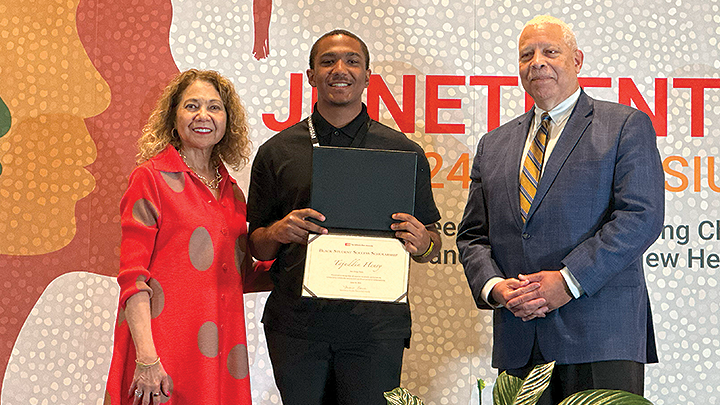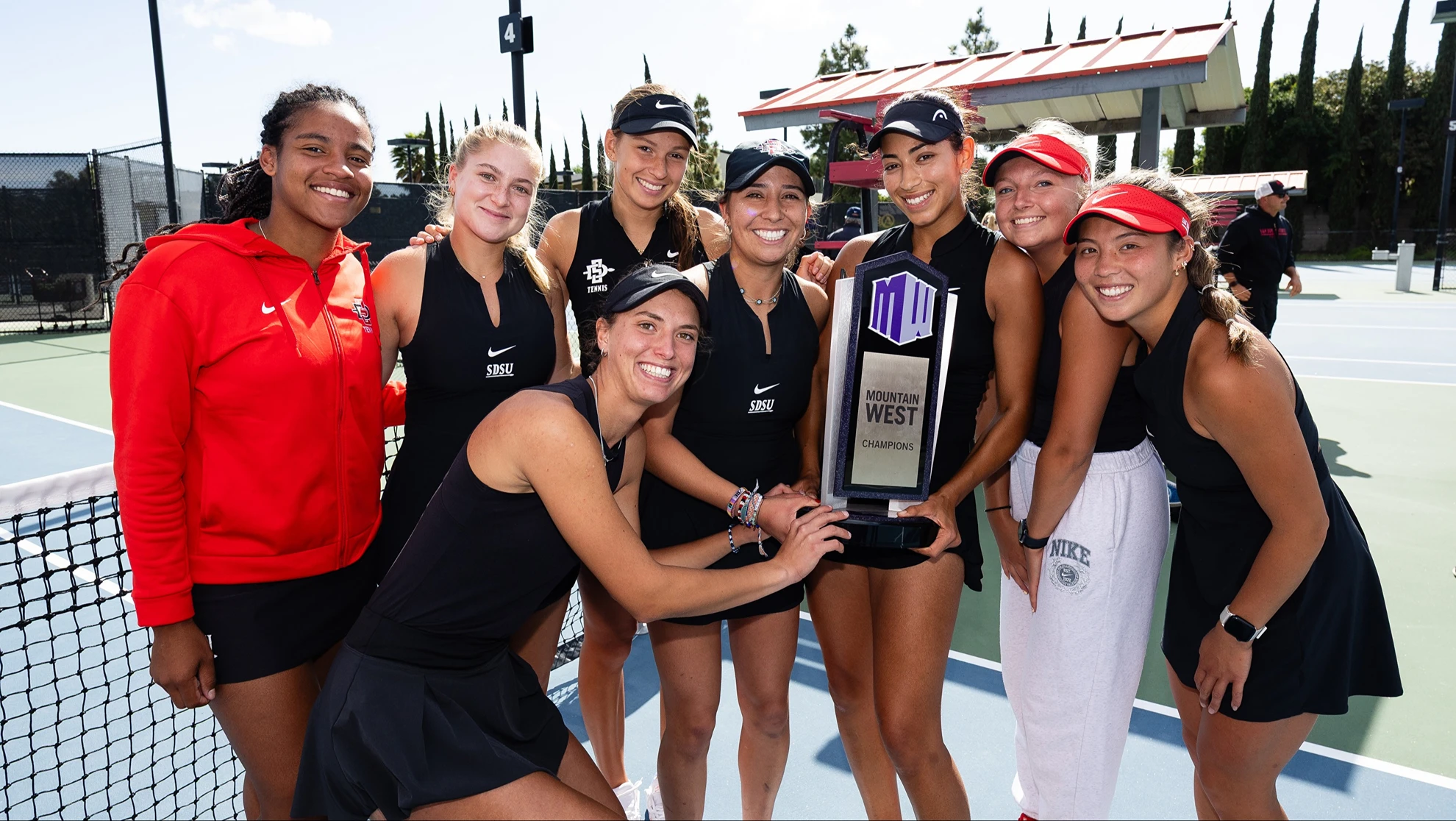First-gen chemistry student awarded fellowship for cancer drug research
How rising senior Alyssa Gomez is making her ‘STEM kid’ dreams reality while setting the stage for future generations in science
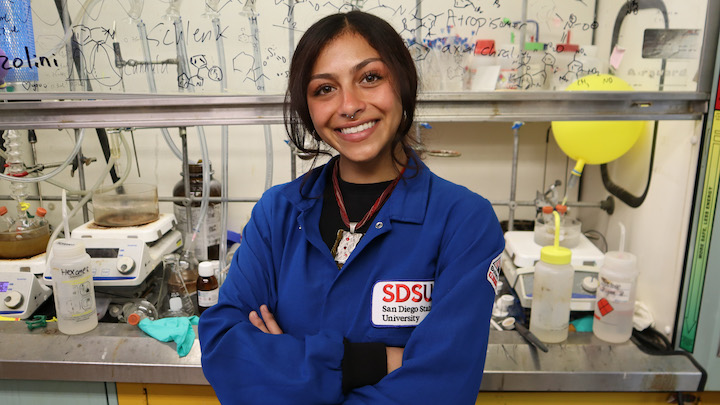
Alyssa Gomez is not afraid of navigating unfamiliar paths. She came to San Diego State University as a first-gen student with a range of interests before deciding to pursue chemistry.
Today, as a rising senior, she possesses a year of lab experience, has presented her work at several conferences and is conducting research to improve cancer treatment through a fellowship from Pfizer.
Gomez has an innate love of learning. Her parents recognized her passion for school and habit of maintaining good grades as signs she should go to college.
“I didn't really know what that looked like because they didn't go to college themselves and their parents didn't. Their parents immigrated here from Mexico and Nicaragua and Puerto Rico,” Gomez said. “I just always did my best in school.”
In high school, she took a host of AP and honors classes, studying subjects from economics to world history. Chemistry was one of her favorites but without in-depth exposure to the field, she wasn’t sure how to apply the concepts.
“I didn't know how you get from high school chemistry to researching cancer,” she said. “I didn’t think I could just go and do that.”
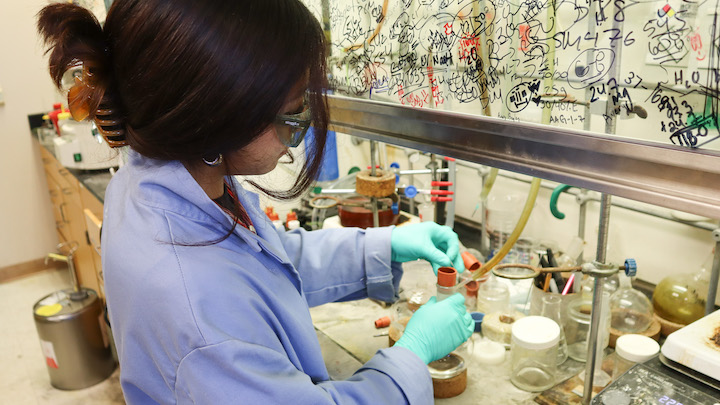 Open the image full screen.
Open the image full screen.Gomez navigated the college application process through Google searches with her parents and an open mind about her future. Hailing from Chula Vista, she enrolled at SDSU under the University’s Compact for Success program with the Sweetwater Union High School District.
Originally undeclared, when it came time to pick a major, Gomez selected chemistry with an emphasis in biochemistry, focusing on her aspiration to work in medical research.
Once she began coursework, she realized she had made the right choice. She excelled in her classes, loving the hands-on nature of chemistry and being able to take what she learned in class and see it in effect in the lab. Organic chemistry, a class most students dread, was “the coolest thing ever” to Gomez.
Joining a Lab
In one of her early chem classes, teaching associate (TA) Brittany Bermoy asked if Gomez had considered doing research.
“I was like, ‘No, what do I look like? That’s crazy!’” she said. “I never imagined myself working in a lab and I had no idea what any of this was.”
After Bermoy brought Gomez into Christal Sohl’s biochemistry lab where she worked, Gomez knew she had unlocked the door to a world she was destined to be part of.
There, fellow undergrad Nicole Sierra (‘24) showed Gomez a research poster she had presented at a past SDSU Student Symposium. Gomez then made it a mental goal to someday present her own research.
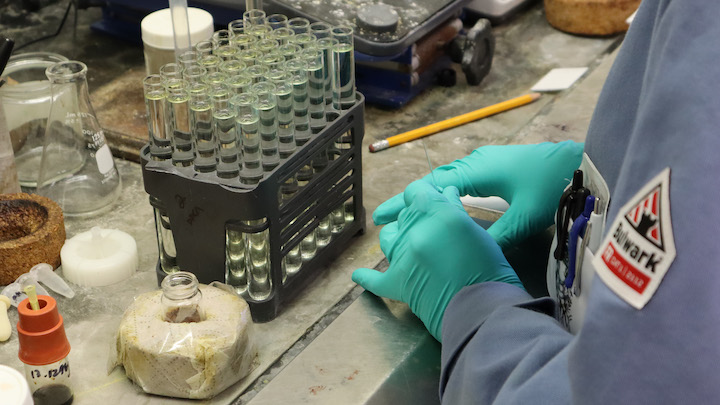 Open the image full screen.
Open the image full screen.In class the following year, biochemist Jeffrey Gustafson mentioned his lab, piquing Gomez’s interest and prompting her to visit. Afterward, fourth year Ph.D. student Beeta Heydari offered to take Gomez on as an undergrad to assist with her medicinal chemistry project.
Gomez eagerly accepted and has spent the past year working in the lab, investigating ways to make medicines more efficient at targeting problematic cells and therefore more effective in treating diseases such as cancer with fewer side effects.
Just a few weeks into working in the lab, Gomez fulfilled her earlier promise to herself by presenting at a symposium. Not long after, she presented at another, stating these experiences encouraged her to think “maybe I can do this.”
Pfizer Fellow
In February, Gomez was awarded the Pfizer La Jolla Academic-Industrial Relations (AIR) Diversity Research Fellowship in Chemistry. Gustafson and members of his lab had nominated her for the program, which promotes diversity and inclusion in the pharmaceutical sciences.
“I think it's really important that well-known companies like Pfizer are actively working to make the field more inclusive and create more opportunities for communities that weren't always included historically.”
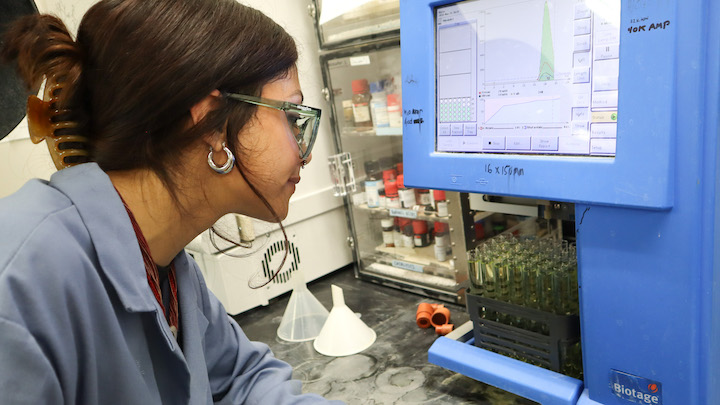 Open the image full screen.
Open the image full screen.“A lot of minority populations come from difficult upbringings and I think with that comes a lot of grit, resourcefulness, and diverse experiences and creative thinking that can be useful in trying to come up with treatments for complex or rare diseases,” she added. “Medical chemistry affects everyone so it is important to let those communities in on the conversation and contribute to how the drugs we're making will ultimately affect them and their communities, especially given the health disparities marginalized communities face.”
Gomez mentioned that paid opportunities like this also help break down barriers of entry to STEM fields by relieving some of the financial burden.
Since the age of 17, Gomez has worked in the food industry to support herself, first at McDonalds, then at mom-and-pop boba shop Lollicup Tea Zone. Before the Pfizer fellowship, she worked 20 hours a week on top of classes and working in the lab, a workload she said was stressful to juggle.
“I’m really grateful that now I can live life and just focus on lab and school while gaining experience for my career,” she said.
After winning the fellowship, Gomez said her dad went straight to Facebook to tout it and when friends and neighbors visited, her parents proudly shared the news.
“It made me happy that they got to experience the success of it too because I wouldn’t have been able to do all this without their support and all the things they pushed me to follow and do in my life,” she said.
A “STEM Kid” From the Start
Gomez says the past year working in the lab has been “amazing.” She even worked through the break last summer and is doing the same this year, saying “this is just fun for me.”
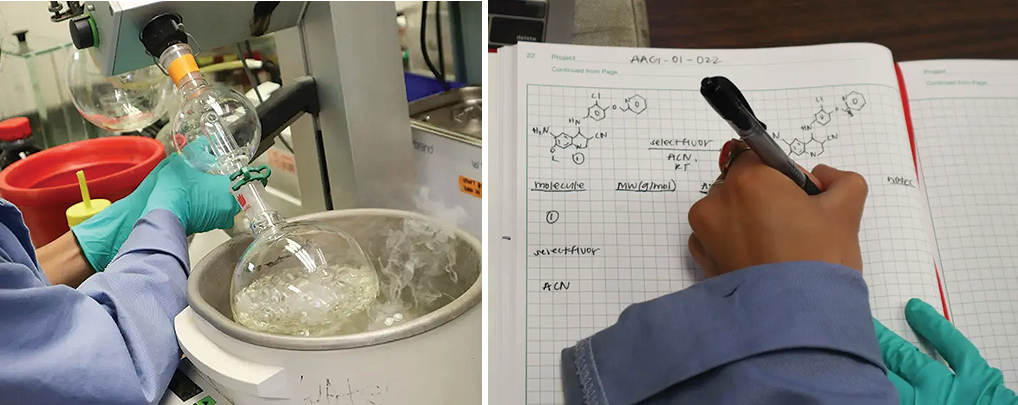 Open the image full screen.
Open the image full screen.“I feel I've grown so much in so many ways, academically and professionally but also just my confidence in life,” she said. “Everyone in the lab wants me to grow and I love that they push me to try new things that are outside of my comfort zone but that will benefit me in the long run.”
Now, she is able to share about her work with her family, educating them on the process for making medicines that impact them while they celebrate in her accomplishments. At the same time, she is setting an example for others.
“I would love to go show younger communities what kinds of things they can realistically go into and how to prep themselves for it,” she said. “I try to encourage my STEM friends to get into research or talk to their professors. And now people have come to me for help with internships, which makes me happy that people can see me as a resource in that way.”
From a self-proclaimed “STEM kid” who grew up watching “Star Wars” and Marvel movies with her dad, and used birthday gift cards to buy science kits from Barnes & Noble, Gomez never let doubts, fears or inexperience prevent her from pursuing her calling.
With the guidance of her family and key mentors in the field, she is blazing new trails and serving as a role model for future generations.

